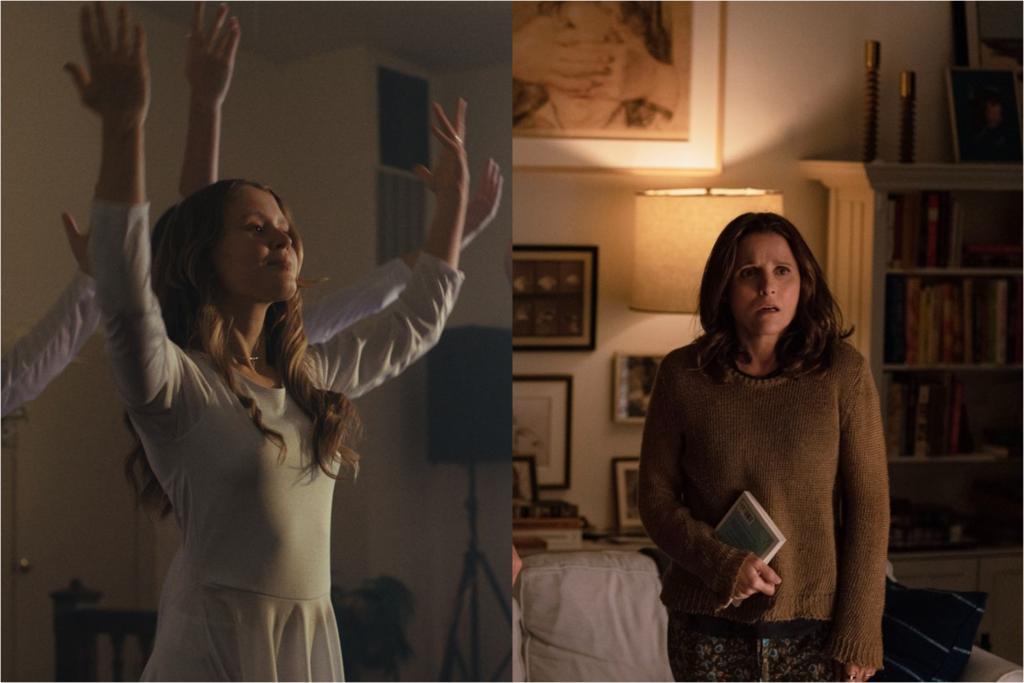
The characters in a Nicole Holofcener picture always have problems, but they tend to be cute problems—like how Catherine Keener can’t decide how to donate her wealth in Please Give, or how James Gandolfini is incapable of whispering in Enough Said. This doesn’t make their emotional confusion or existential despair any less real; it’s just that their floundering is undergirded by a bedrock of professional success and academic sophistication. So what’s interesting about You Hurt My Feelings, Holofcener’s latest look at privileged people, is that while this sense of accomplishment remains firmly in place, it’s also questionably earned. The heroes of this movie all live in nice Manhattan homes and hold impressive jobs, yet they don’t seem to actually be good at anything.
Beth (Julia Louis-Dreyfus) is a published author who teaches a creative writing course, but her memoir didn’t sell and she’s yet to land a second book deal; her students are shocked to learn that she’s a real writer. Her husband, Don (Tobias Menzies), is a therapist who’s been practicing for decades, yet his patients are constantly complaining that he never actually helps them. (Whenever he’s with a client, he hangs a shabby “In Session” sign on his door.) Their son, Eliot (Owen Teague), works at a weed dispensary and is perpetually drafting a play that’s never close to being finished. Beth’s sister, Sarah (Michaela Watkins), is an interior decorator who seems to only have one client—a woman who never approves of her banal fixture suggestions. Sarah’s husband, Mark (Arian Moayed), is a struggling actor who’s yet to receive his big break.
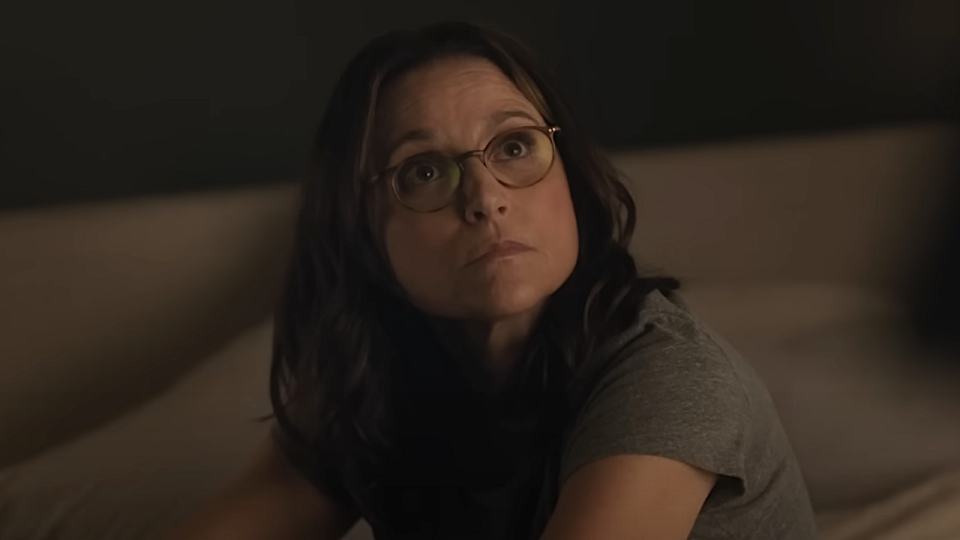
There is a nominal angle to You Hurt My Feelings that focuses on self-improvement, examining how these ineffectual intellectuals strive to reignite their careers and shake off their debilitating ennui. But because Holofcener is clinically allergic to standard-issue plots, these commercial efforts prove ancillary to the movie’s main concern, which is to consider how adult relationships subsist via the competing combination of sincerity and deception.
Beth and Don seem to have a happy marriage—this is evidenced by the cute anniversary gifts (earrings, a V-neck) they exchange at a romantic dinner—and you would assume that mutual honesty is a cornerstone of their contentment. Yet one day, Beth overhears Don confessing to Mark that while he generally likes Beth’s writing, he hates her new book—you know, the one she’s been desperately trying to pitch, and which he’s repeatedly assured her is wonderful. This inadvertent eavesdropping sends Beth into a spiral of self-doubt, even as it provides Holofcener the excuse to hack away at social norms with her comic scalpel.
Is Don’s false praise a mark of betrayal, or a gesture of encouragement? Is politesse a façade we wield to mask our true thoughts, or is avoiding awkwardness critical to mature interaction? Are filters fair or foul? And why does one of Don’s patients (Zach Cherry) keep muttering profane insults as he leaves the office yet still dutifully return to the couch the following week?
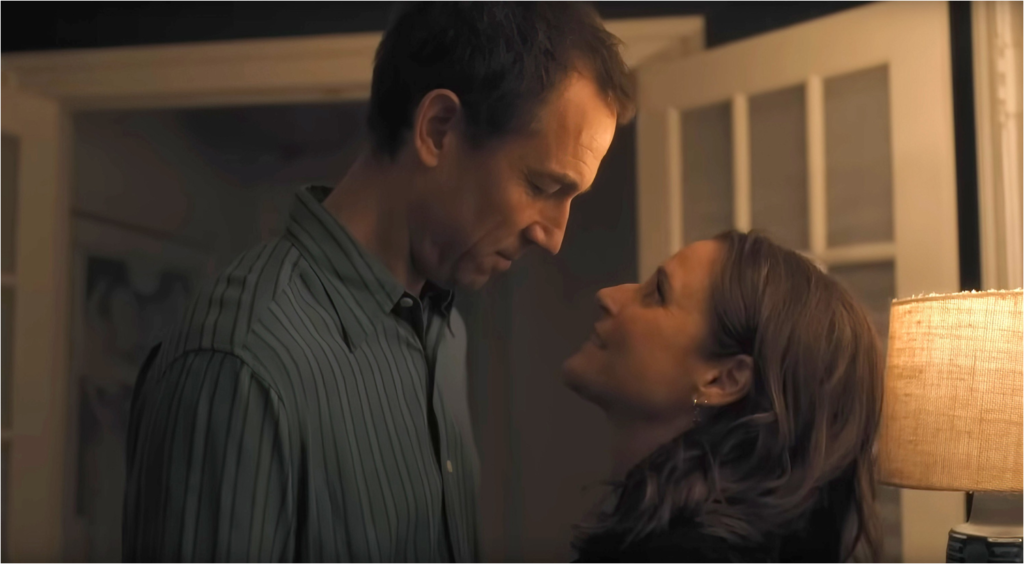
You Hurt My Feelings explores these questions with insight, empathy, and (har har) honesty—along with a certain vagueness. On a scene-to-scene basis, the movie is funny and appealing; Holofcener is a skilled dialogue writer and a perceptive student of human behavior, and her conversations—performed by a company of agile actors (despite Menzies’ uneven American accent)—sing with cinematic rhythm. The exchanges between Beth and Sarah are particularly pleasurable, with Louis-Dreyfus and Watkins honing a sororal chemistry that suggests a lifetime of shared squabbling.
And yet, despite its intelligence and naturalism, You Hurt My Feelings is thematically blurry in a way that’s oddly frustrating. I’m not suggesting that Holofcener needed to proclaim a specific point of view, but it would be nice if she had something to say beyond composing a medley of cringeworthy vignettes. At some point, her characters’ lack of growth starts to reflect on the static quality of her own filmmaking.
Or maybe I’m just being defensive. After all, now I’m forced to wonder about the (very small) handful of people who’ve previously complimented my own writing. They seemed genuine at the time, but did they really mean it? Or were they just being nice? Grade: B-
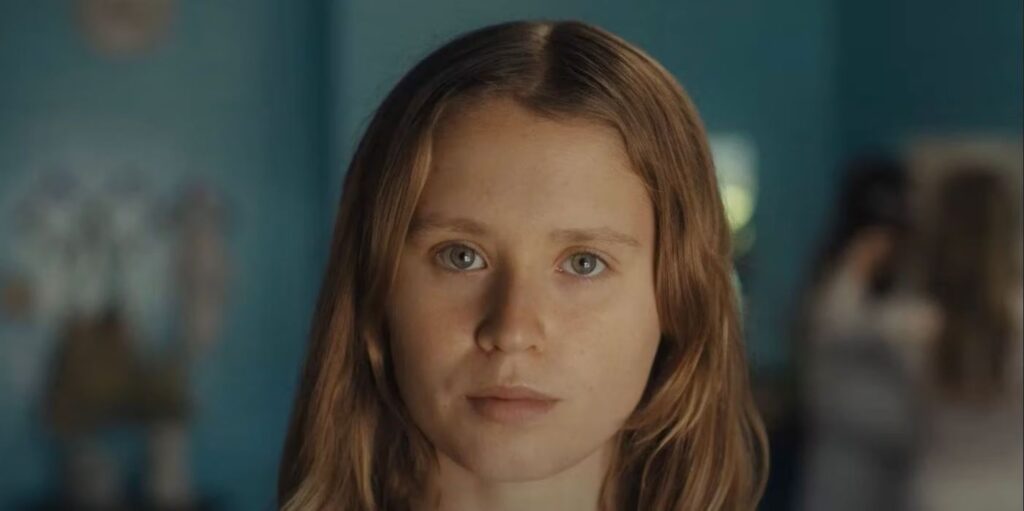
For the past half-decade, ever since she burst onto the scene as Amy Adams’ troubled half-sister in Sharp Objects, Eliza Scanlen has been tweaking the archetype of the Teenage Girl in Peril. She specializes in playing young women who suffer from some sort of malady or misfortune—be it scarlet fever (Little Women), cancer (Babyteeth), sexual assault (The Devil All the Time), or, er, supernatural issues (Old)—to the point where her characters’ short life spans became something of a running joke. I won’t disclose whether Scanlen’s newest incarnation, a 17-year-old dreamer named Jem, makes it all the way through The Starling Girl, but I can safely say she doesn’t lack for torment.
When the movie opens, however, Jem seems perfectly content. The eldest daughter of a fundamentalist Kentucky family (her parents are played by an unsteady Jimmi Simpson and a just-right Wrenn Schmidt), she routinely drives them all to church in their minivan, playfully groaning at her father’s singing and comfortably serving in a maternal capacity to her baby sister. She excels in the congregation’s female dance troupe, and her strong community standing has earned the admiration of the head pastor (Kyle Secor), who selects her for courtship via his younger son, Ben (Austin Abrams). What passes for conflict is a quiet moment when a fellow parishioner politely informs her that her bra is visible through her blouse, a delicate chiding that sends the pious Jem into a fit of shame and panic. (Her willpower is as fierce as her decorum: When she finds her hand slipping between her thighs late at night, she stops herself by murmuring the mantra, “Out, Satan, out.”)
Things could be worse, and in fact they soon are. The agent of Jem’s agony—the wolf in cleric’s clothing—is Ben’s older brother, Owen (Lewis Pullman). With windswept black hair and casual charisma, Owen has recently returned from a mission in Puerto Rico, and he struggles to reintegrate himself, feeling distant from both his flock and his wife (Jessamine Burgum). But he discovers a certain kinship with Jem, and before long he’s giving her rides home (her bike had a flat, you see), asking her to keep an innocuous secret, and—in a moment of telling, queasy intimacy—instructing her to spit out her chewing gum directly into his hand. And then…
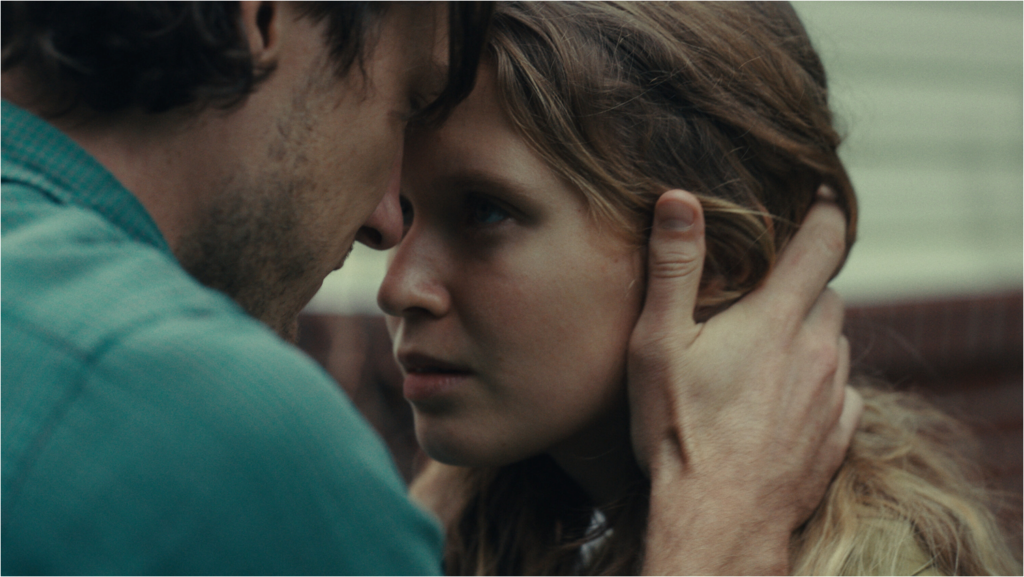
But you already know. The debut feature of writer-director Laurel Parmet, The Starling Girl is faintly predictable in its bold strokes, following a preordained trajectory with rigorous, helpless inexorability. It depicts a textbook case of predatory grooming, and studied from an intellectual remove, its horrors can appear familiar as well as devastating. Oh, great, this stuff again? (Certainly it lacks the warped humor and twisted vitality of Sean Baker’s Red Rocket.)
Yet despite its conventionality, The Starling Girl evades the usual traps of miserabilism and sanctimony. Some of this is thanks to Parmet’s detailed setting; the film’s story of abuse could happen anywhere, but it emphatically takes place in this particular Kentucky community, with its archaic codes of behavior and its perverse manipulation of scripture. “His life is ruined,” a village elder says of Owen as he accuses Jem of letting Satan into her heart. Such victim-blaming is hardly unique to parochial officials, but here it carries a specific sectarian sting, as does the looming threat of a correctional camp known for its violent therapeutic methods.
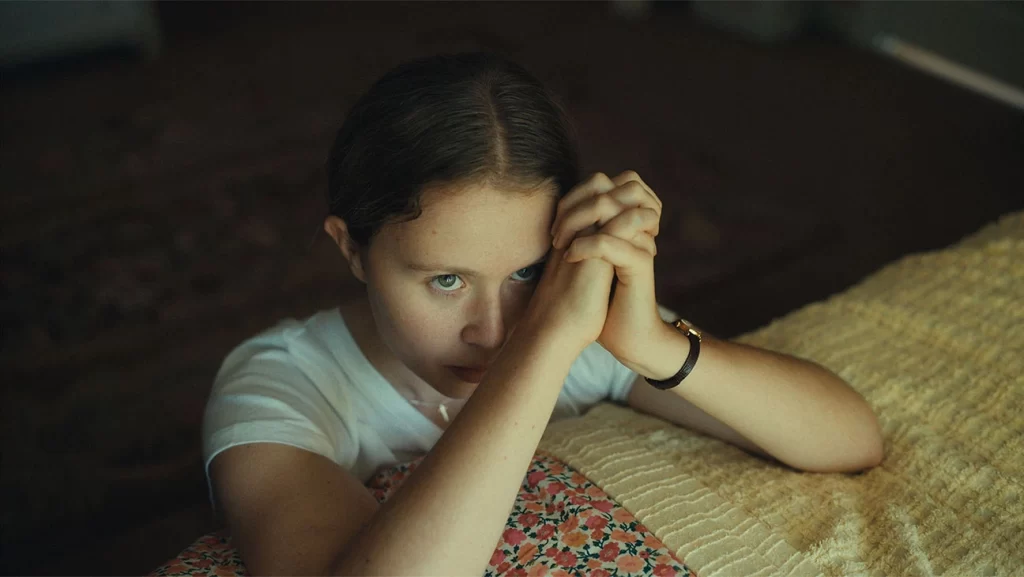
But the real key to The Starling Girl is the Starling girl; the movie’s subject matter may be wearily typical, but there is nothing rote or recycled about Scanlen’s performance. Aged 23 at the time of production, she’s still capable of conveying teenage naïveté, but while her youthful vulnerability is crucial on its own, it also works in tandem with her feverish elation. When Jem reads a discreetly passed note from Owen scheduling a midnight rendezvous, the flash of joy that crosses Scanlen’s face seems to spread throughout her entire body, and its purity is heartbreaking.
The Starling Girl traffics in deeply disturbing material, but the experience of watching it isn’t punitive. That’s most true of its final scenes, when the movie breaks free from the shackles of expectancy, daring to suggest a future for Jem that isn’t permanently clouded by trauma. Is it delivering a miracle? Maybe, but not the kind Owen or his father could comprehend. In allowing Jem to reclaim a measure of her agency, Parmet and Scanlen aren’t revealing god’s will but are paying tribute to her own, decidedly human spirit. Grade: B+
Jeremy Beck is the editor-in-chief of MovieManifesto. He watches more movies and television than he probably should.

There is a critic named Jeremy Beck
Who guides us to movies we should check.
We never have to hunt and peck
Leading to an emotional wreck.